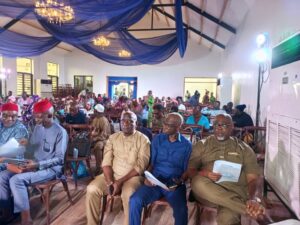Nigeria’s pension crisis: Why immediate issuance of the N758bn bond is non-negotiable

Ivor Takor
Report by Ivo Takor, mni Esq.
On February 5, 2025, Nigeria’s Minister of Finance, Mr. Wale Edun announced that the Federal Executive Council (FEC) had approved the issuance of a N758 billion bond. This decisive intervention aims to clear the backlog of pension liabilities under the Defined Benefit Scheme (DBS) and settle the government’s outstanding responsibilities under the Contributory Pension Scheme (CPS).
The announcement, which was three (3) months ago, was lauded by stakeholders as a significant step towards resolving one of the most persistent challenges in Nigeria’s public service landscape—the chronic delay in the payment of retirement benefits payments.
A Longstanding Crisis in Pension Administration
For decades, thousands of federal retirees have waited in vain for their hard-earned pensions. Under the DBS, where the government bears full responsibility for paying retirees, delays and underfunding have become the norm. The introduction of the CPS in 2004 was intended to address these issues through a structured savings mechanism shared between employer and employee.
However, the federal government’s failure to remit its counterpart contributions consistently has undermined the scheme’s effectiveness, creating a dual burden: unpaid pensions under the DBS and mounting liabilities under the CPS. The approved bond is designed to tackle both.
The Human Cost of Delayed Pension Reforms
While the Federal FEC approval of the N758 billion bond is a necessary intervention, it does not erase the immense human cost that has resulted from years of inaction and bureaucratic inertia. In Nigeria, the gape between policy announcements and implementation can be fatal—especially for vulnerable pensioners.
Across the country, retired federal civil servants are often be seen protesting outside government offices or enduring long, disorderly queues at verification centres — sometimes in sweltering heat or pouring rain— only to leave empty handed. Tragically, many die before receiving a single kobo of their entitlements. Others resort to begging, rely on relatives for shelter, or skip essential medications due to financial hardship.
Retired teachers, police officers, and civil servants—who dedicated 30 to 35 years in service—now living in squalor, unable to afford basic necessities like food, shelter, or healthcare. Widows and those with chronic illnesses face impossible choices between buying medicine or eating. The psychological toll is equally devastating, with depression, anxiety, and a deep sense of betrayal plaguing those who once served our nation faithfully.
This sufferings has far-reaching consequences:
It demoralizes current civil servants who view retirement not as a time of dignity but as a period of abandonment.
Younger workers distrust pension deductions , doubting they will ever benefit from the system.
The credibility of institutions like the National Pension Commission (PenCom) is eroded when the government fails to meet its obligations.
In essence, delayed in pension payments are not just an administrative failure – they represent a humanitarian crisis demanding urgent resolution.
A Step Toward Sectoral Stability
If executed properly, the N758 billion bond could reset the Nigeria’s pension narrative by:
• Clearing backlogs for thousands of long-waiting pensioners.
• Restoring trust among current CPS contributors.
• Strengthening liquidity for Pension Fund Administrators (PFAs) and Pension Fund Custodians (PFCs).
• Stimulating economic activity as retirees finally receive and spend their entitlements.
This could mark the beginning of long-term stability – if implementation is swift and transparent.
Need for Oversight and Reform
To ensure success, robust accountability mechanisms must be established. A multi-stakeholders monitoring committee – including PenCom, trade unions, retiree groups, and civil society—should oversee fund disbursement and progress tracking.
Long-term, reforms must also treat pension liabilities as statutory obligations in annual budgets to prevent future arrears.
Conclusion: A moral and Fiscal Imperative
The N758 billion bond is more than a fiscal decision—it is a moral obligation. Nigeria must honor its promises to those who served the nation. While policy announcements matter, timely execution is what delivers justice and restores government credibility.
If implemented without delay, this bond could mark a turning point in Nigeria’s pension system, offering hope to retirees and confidence to the workforce.
The time to act is now.
Ivo Takor, mni Esq is a public affairs analyst, a social justice advocate and Vice Chairman/ Chairman Human Rights Committee of Nigerian Bar Association (NBA) Epe Branch.




